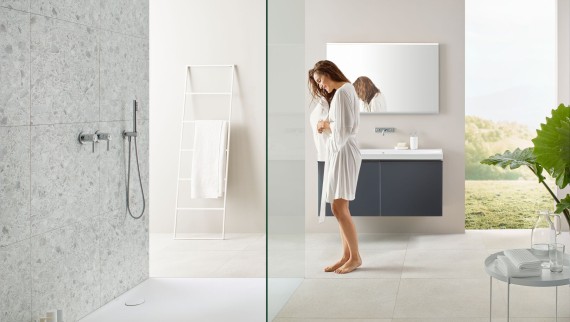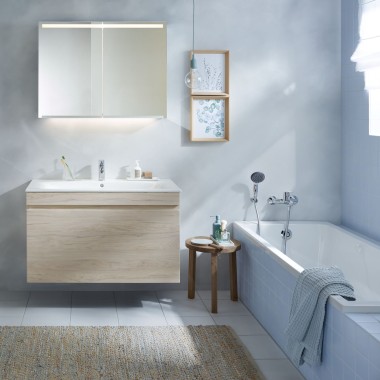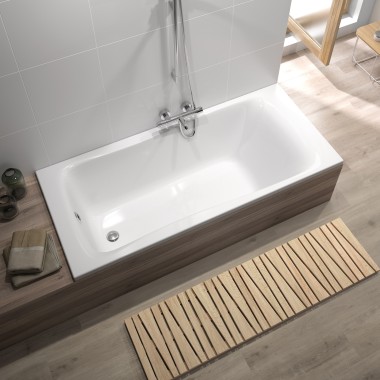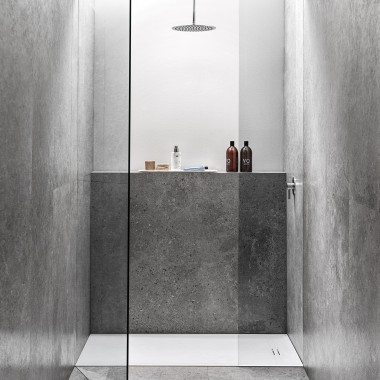Shower or bathtub what’s the best option?
Opinions differ widely on whether it is better to take a shower or have a bath. For some, the bathtub is an essential feature of a bathroom as it offers comfort and relaxation. Others prefer a shower as it takes up little room and saves time during personal hygiene routines.
How much space is needed in the bathroom for a shower or bathtub?

Showers are available in many space-saving versions and sizes, with widths and lengths that allow for optimal use of the available space. In order to be able to stand upright and move freely, the length and width of the shower tray should be at least 32 inches. If a showerhead is installed, make sure that this is mounted at a height of approximately 78 inches and with a headroom of 8 inches.
If a barrier-free bathroom is needed, then local standards for barrier-free construction must be adhered to. This means that the shower tray has to be a certain minimum size and must be embedded in the floor so that wheelchair access is guaranteed. A barrier-free bathroom with shower, toilet, and washbasin should be at least 70 x 70 inches.
A bathtub needs more space. If the bathtub is at least 60 inches long and 24 inches wide, then users can lie down in comfort. These dimensions can vary according to the model.
If the bathtub is also used for showering, a bathtub with shower zone is recommended. These have a vertical wall inclination on one side that allows users to stand upright when showering.
Bathtub or shower – which installation is more complex?
The installation outlay depends on various factors. The infrastructure, product selection, and structural conditions determine how complex the installation of a bathtub or shower is.
Bathtubs are usually larger than shower trays and therefore need more space. They require a connection for the bathtub faucet, a drain, and also a bathtub overflow that is connected to the water outlet system.
The installation of a shower can be more complex if a floor-even shower is planned. More tiling and sealing work is needed here in comparison to the bathtub. The shower tray requires a connection for the showerhead and the outlet pipe bend.
However, bathtubs and shower trays can generally be installed without difficulties provided attention is paid to ensuring the right installation solution for the on-site construction situation.



These are the advantages of showers and bathtubs
There are various points in favor of a bathtub or shower in your bathroom.
Saves space and water: five advantages of showers
- A shower can be installed in a small space, with an unusual floor plan, and regardless of the roof pitch.
- Floor-even showers make it easier to enter the shower area and enable barrier-free showering.
- A room can look larger if the shower tray is adapted to suit the bathroom design. Open-plan showers with a glass walk-in shower panel and tiles that are laid uniformly and seamlessly across the bathroom and into the shower area can help here.
- It is quicker to take a shower than a bath and it is also more environmentally friendly as the water consumption is lower. This saves time, money, and energy. As a comparison: on average, you need around 40 gallons of water to fill a bathtub; a five-minute shower saves around three times the amount of water, providing you turn the water off while you soap yourself.
- A shower can also become an eye-catcher with a range of highlights such as a specially shaped showerhead, a colorful shower curtain or patterned tiles.
Comfort for the entire family: five advantages of bathtubs
- Having a bath is fun. In a family bathroom, the bathtub is often very popular with children because they get a feel for hygiene in a playful way and can splash around.
- The advantage of a bathtub is that you don’t have to decide between bathing and showering. In the case of people who are no longer physically fit, there are bathtubs with a seat and a door to make it easier to get in. A corner bathtub can be a good solution in a small bathroom.
- A bathtub represents comfort. Taking care of your personal hygiene as you lie back and relax is a joy. Bathtubs with massaging jets and sprays help ensure even more relaxation. This also offers a perfect substitute for a separate hot tub or whirlpool.
- A pleasantly warm bath is good for your health. It helps get rid of everyday stress and warms your body up on a cold day. If you’re coming down with a cold, a bath will help your blood flow and support the body’s natural defences. If you want, you can add bath oil to the water.
- Bathtubs in unusual shapes and styles enhance the bathroom. Alongside standard-size bathtubs, there are also freestanding bathtubs, bathtubs embedded in the floor, and corner bathtubs with an appealing design.
Shower or bathtub – what to look out for when planning the bathroom
In a well-planned bathroom, attention is primarily paid to aspects such as the optimal use of space, needs in terms of design and functions, and the available infrastructure (ventilation, lighting, and sanitary installations).
In a rented apartment, the bathroom usually has different requirements compared to the fittings in a hotel room. How much space is available in the bathroom? Who is the bathroom being used by? Where have pipes already been laid? Last but not least, a realistic budget is also needed. Ask yourself whether your plans can be implemented with the budget available.
Help when making a decision
Our tip: your dream bathroom can be visualized online in just a few steps with a simple planning tool. The true-to-scale visualization allows for various design scenarios with shower and bathtub to be tested out. This can help when making a decision.
What is the best option for a rented apartment: bathtub or shower?
In a rented apartment with just one bathroom, a shower is usually the best solution. A shower needs less space, saves water and time, and barrier-free access is also possible. If a rented apartment has two wet units, then a shower is often installed in one room and a bathtub in the other.


